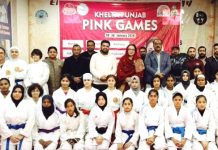New Delhi, May 1 (TNS): The Narendra Modi-led Indian government has agreed to revive the Track II diplomacy process with Pakistan despite its apparent aversion to conventional talks with the neiughbouring country, Indian media reported on Tuesday.
According to Indian reports, the original Track II initiative, called the Neemrana Dialogue, received a fresh start when a high-powered delegation of former Indian diplomats, military veterans and academics travelled to Pakistan on 28 April to discuss ways to improve the India-Pakistan relationship.
The initiative this time was taken by Pakistan that wanted this dialogue to happen in Islamabad, since the dialogues so far had been happening in third countries.
The delegation was headed by former Indian Ministry of Economics Affairs (MEA) secretary and Pakistan expert Vivek Katju. JS Rajput, former National Council of Educational Research and Training (NCERT) head, was also a part of the delegation. The talks took place from 28 to 30 April where Pakistan was represented by former foreign secretary Inam ul Haque and Ishrat Hussain among others.
The bilateral dialogue gets its name from the Neemrana Fort, where it was first held in 1991-1992. While it is similar to other Track II mechanisms in that Neemrana is also a non-governmental dialogue, it is different from others in the fact that both the foreign ministries have in the past associated themselves with it.
To many though, the revival of Neemrana would suggest that the policy of not having any engagement with Pakistan no longer holds ground. “There have been other Track II initiatives, but these were mostly funded by third parties. Neemrana had more India-Pakistan character,” said former Indian high commissioner to Pakistan TCA Raghavan, according to a Times of India report.
According to the report, former foreign secretary Kanwal Sibal, who is a member of the Neemrana group, has chosen not to visit Pakistan for the dialogue. He, however, said that Neemrana was an important initiative which had even survived some very difficult times in the relationship. “Neemrana has had a tough time over the past few years. Both sides felt though that it was important to keep alive that tradition but I didn’t go because I don’t think it would yield significant results in the current circumstances,” said Sibal.
Official sources said that it was Pakistan’s turn to host the Track II dialogue but it could not take place earlier because Islamabad refused to approve it. This was apparently to show its displeasure over India’s position that there could be no official talks with Pakistan until it delivered any solid state action against the alleged breeding and funding of terrorists on its soil.
buy levitra professional online https://www.adentalcare.com/wp-content/languages/new/levitra-professional.html no prescription
The thinking behind India’s decision to allow the meeting to take place, according to sources, was that it would help those participating to assess the mood in Pakistan on important issues related to security, economy and also Afghanistan. Also, with Pakistan likely to go to polls in July, the meeting holds significant political importance as well.
Earlier, India and Pakistan had held an Track II dialogue when Prime Minister Narendra Modi had met then Pakistan prime minister Nawaz Sharif on 10 July on the sidelines of the Shanghai Cooperation Organisation (SCO) Summit in Ufa, Russia. This was the second such attempt under the Sharif government.
Sharif’s first such effort came in 2013 when soon after his election, Sharif initiated the Track II by appointing Ambassador Shahryar Khan as his point person for the purpose. However, when the Modi government came to power the following year, they initiative was left on the back-burner.
“The 10 July meeting provided an opportunity to identify some areas where the two countries could promote cooperation right away in order to reduce tensions and hostility,” Pakistan’s former foreign minister Sartaj Aziz had said then.
There are fundamental differences in the perspectives of the two countries that rule out any substantial yet amicable solution. According to AK Verma, the former chief of Research and Analysis Wing of India (RAW), India looks at Pakistan through the prism of geography and territory, whereas, for Pakistan, the problems with India are rooted in the mists of ideology. “A meeting ground is, therefore, difficult to attain”, he says.
At the heart of Pakistan’s stance is the two-nation theory which claims that the Muslims and Hindus of India constituted two different nations. Verma says that although the Indian leaders of pre-partition vintage considered this theory to be spurious, they acquiesced to Pakistan’s creation in 1947 on this basis. This theory has thus compelled Pakistan to continuously deny multi-religious harmony to thrive within it and as Verma put its, “the idea of Pakistan has been nurtured through such a denial”.
Over the decades Pakistan has been in existence, Hindus have been systematically driven out and its Islam widely Saudiised and Wahabiised.
The traumatising experiences of partition, resulting in the killing of hundreds of thousands, etched deeply in the Pakistani psyche, also contributes in its definition. And hence, it will not accept any solutions to its problems with India which do not fit in its ideological framework or run counter to its two-nation theory. Therefore, Verma says that currently “solutions lie well beyond the capacity of any dialogue”.
Courtesy: FIRSTPOST














